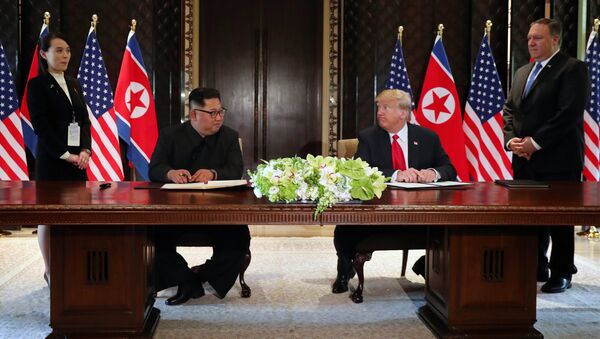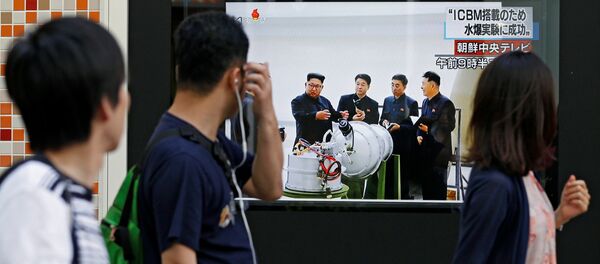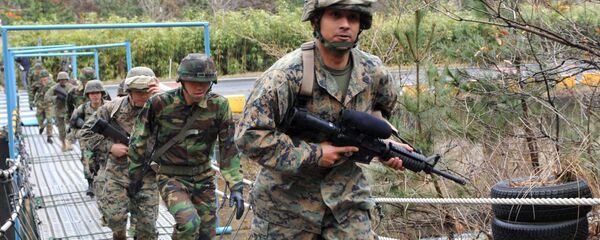Amid rapid progress of North Korea’s nuclear arms program last year, China, the isolated nation’s largest trade partner, joined the international community’s efforts to rein in Pyongyang’s nuclear ambitions and voted in support of a series of UN resolutions on strict economic sanctions, further straining bilateral relations that soured after Kim Jong-un took power in late 2011.
Kim’s surprise visit to Beijing in late March and his subsequent meeting with Chinese President Xi Jinping in Dalian in Northeast China in early May eased concerns that Beijing’s interests could be ignored in the peace talks on the nuclear crisis.
Marginalization Concerns
One week after his historic meeting with Trump, Kim kicked off his third visit to China in four months on Tuesday, the official China Central Television reported. Chinese political analysts argued that Beijing needed to reassure its role in resolving the nuclear crisis on the Korean Peninsula by continuing to improve relations with Pyongyang.
"It’s useless for China to worry about closer ties between Pyongyang and Washington. Improving relations with North Korea is the only way for China to maintain its right to take part in resolving the nuclear crisis on the Korean Peninsula and continuing to play an important role," Shi Yinhong, a professor of international relations at the Renmin University in Beijing, told Sputnik.
READ MORE: N Korean Leader Expected to Visit China Tuesday — Reports
The Beijing-based scholar expects China to start providing economic assistance to North Korea in the near future.
"The rapid improvement of bilateral relations between China and North Korea in recent months resulted from each side’s needs to serve its own interests. Both sides are also determined to maintain the precious improved relations. I believe Kim Jong-un will clarify his intention in seeking economic assistance from China. Chinese President Xi could also make a clear promise to offer economic assistance to North Korea," he said.
The expert added that China had its right to interpret the existing economic sanctions under UN resolutions.
Playing Great Powers to Perfection
Despite North Korea has not given up any single piece of its nuclear arsenal, the United States and China continued to tussle for greater influence over Pyongyang, which has only made a promise to denuclearize so far. Kim Jong-un has taken advantage of the geopolitical tension between Great Powers such as the United States and China and played both sides to perfection, political analysts argued.
"No matter it’s before or after North Korea completed its nuclear arms program, both China and the United States have always had this kind of ‘narrow-minded geopolitical thinking,’ which focuses on avoiding hurting their own interests. North Korea has always been taking advantage of this kind of suspicion and disagreement between Great Powers and played it to an extreme level," Zhao Tong, a fellow at Carnegie’s Nuclear Policy Program at the Carnegie-Tsinghua Center for Global Policy in Beijing, told Sputnik.
The expert illustrated how North Korea played China and the United States against each other.
"Before North Korea became a nuclear power, the United States did not want to face the risks of a military attack against Pyongyang, trying to divert the cost of resolving the crisis toward China by persuading Beijing to exert its economic influence. China refused to take up this responsibility, which could risk turning North Korea against it," he said.
READ MORE: North Korea Reportedly Possesses Up to 3,000 Nuclear-Related Facilities
The Chinese scholar believes denuclearization of North Korea will become a secondary concern for both China and the United States in the near future, as both nations wrestle for greater influence over Pyongyang.
"Under the background of geopolitical competition between China and the United States, I believe many Chinese academics start to be more and more worried about North Korea moving too close to the US side. The focus in the future will become how to make sure China-North Korea relations will be better than US-North Korea relations. As to when North Korea will denuclearize completely, it will not be the most important and pressing concern," he said.
Symbolic Agreement
Zhao from the Carnegie-Tsinghua Center for Global Policy offered two different theories on why Trump agreed to such a vague promise from Kim Jong-un.
"The United States may have realized that it has lost additional measures to continue substantial pressure against North Korea. It had to face this kind of reality and accept a rather empty agreement that did not touch North Korea’s existing nuclear capabilities. It’s also possible that the United States holds onto the fantasy that North Korea could denuclearize completely before Trump finishes his first term in office. It’s unclear why the United States accepted this kind of symbolic agreement [on denuclearization]," he said.
READ MORE: Kim: 1, Trump: 0 Say Experts as Dust Settles After Singapore Summit
Nevertheless, the expert believes it is unlikely for North Korea to conduct additional nuclear or missile tests in the near future, as long as its existing nuclear arsenal remains untouched.
The views and opinions expressed by the speakers do not necessarily reflect those of Sputnik.







